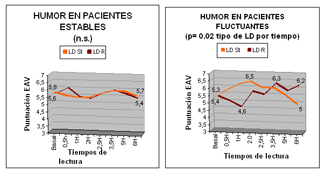A drug aganist Parkinson's disease that affects patients' mood

Levodopa (LD), one of the main drugs presently available for the treatment of Parkinson’s disease (PD), originates mood changes in patients with PD. It is usually taken orally and two formulations are marketed, immediate release levodopa (IR-LD), and controlled-release levodopa (CR-LD). Patients with PD can be classified as stable, when the motor symptoms do not change significantly throughout the day, or as fluctuating, with oscillations of the motor state throughout the day in relation to the dose of the dopaminergic agents. The aim of our study was to determine whether these two formulations of LD influence the mood of patients with stable and fluctuating PD in a different way.
We studied 14 patients (7 stable and 7 fluctuating) over several hours on two different days. At the start of each study day, one dose of either CR-LD or IR-LD was administered following a randomized and double-blind methodology. During the following six hours, the patients were examined at different times: the motor state was evaluated with the UPDRS scale, and mood and anxiety were assessed with the visual analogical scales (EAV) for these states. These scales consisted of a 10 cm horizontal line where the patient marked how her or she felt concerning mood or the anxiety at that precise moment. LD blood levels were measured at different times over these six hours.
The main result was that only the fluctuating patients presented a significant increase in mood under the effects of IR-LD. Moreover, the motor situation of these fluctuating patients had a relationship with the blood levels of LD and with anxiety, but not with the mood scores. The conclusion was that mood changes in PD patients are related to the patient’s motor response to LD and the rapid increase of LD levels in blood, while anxiety is more related to the patient’s motor state than to mood.
References
Kulisevsky, Jaime; Pascual-Sedano, Berta; Barbanoj, Manel; Gironell, Alexandre; Pagonabarraga, Javier; Garcia-Sanchez, Carmen. Acute effects of immediate and controlled-release levodopa on mood in Parkinson's disease: A double-blind study. MOVEMENT DISORDERS, 22 (1): 62-67 JAN 2007.

